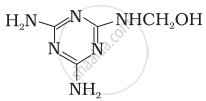Advertisements
Advertisements
प्रश्न
Which of the following polymers soften on heating and harden on cooling? What are the polymers with this property collectively called? What are the structural similarities between such polymers? Bakelite, urea-formaldehyde resin, polythene, polyvinyls, polystyrene.
उत्तर
Thermoplastic polymers are linear or slightly branched long-chain molecules. These are capable of repeatedly softening on heating and hardening on cooling. These polymers possess intermolecular forces of attraction intermediate between elastomers and fibres. Some common thermoplastics are polythene, polystyrene, polyvinyls, etc.
Thermosetting polymers: These polymers are cross-linked or heavily branched molecules, which on heating undergo extensive cross-linking in moulds and again become infusible. These cannot be refused. Some common examples are Bakelite, urea-formaldehyde resins etc.
APPEARS IN
संबंधित प्रश्न
Write the structures of monomers used the following polymers:
Glyptal
How is the following resin intermediate prepared and which polymer is formed by this monomer unit?

(Resin intermediate)
Match the polymers given in Column I with their commercial names given in Column II.
| Column I | Column II |
| (i) Polyester of glycol and phthalic acid | (a) Novolac |
| (ii) Copolymer of 1, 3-butadiene and styrene | (b) Glyptal |
| (iii) Phenol and formaldehyde resin | (c) Buna-S |
| (iv) Polyester of glycol and terephthalic acid | (d) Buna-N |
| (v) Copolymer of 1, 3-butadiene and acrylonitrile | (e) Dacron |
Which of the following is used in paints?
Reaction of HBr with propene in the presence of peroxide gives
Glyptal is a :-
Which of the following is not polyamide?
The commercial name of polymethyl (methacrylate) is ______.
Soft drinks and baby feeding bottles are generally made up of ______.
Match List - I with List - II.
| List I (Polymer) |
List II (Used in) |
||
| (A) | Bakelite | (I) | Radio and television Cabinets |
| (B) | Glyptal | (II) | Electrical switches |
| (C) | PVC | (III) | Paints and Lacquers |
| (D) | Polystyrene | (IV) | Water Pipes |
Choose the correct answer from the options given below:
